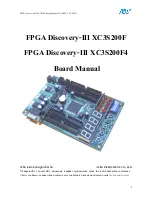
48
C
HAPTER
3: N
OVELL
N
ET
W
ARE
E
NVIRONMENTS
parameters) using the CONFIG command from the server
console command prompt.
At system boot, the PCI BIOS determines slot numbers for
all PCI NICs. Adding or removing PCI NICs can cause the slot
numbers of all other PCI NICs to change. Therefore, after
adding or removing PCI NICs in your machine, you should
verify the slot numbers used by all PCI NICs (including the
3C359B NIC) and change the LOAD command SLOT=
parameters for them accordingly.
FRAME=<type>
Specifies the frame type used by this
logical board. (A “logical board” means a particular
instance of loading the server driver.)
You do not need to include this parameter if you will be
using only the default frame type, TOKEN-RING. But you
must make sure the server driver is configured for all frame
types used on the network.
If you want to use both frame types, you must load the
driver twice, as shown below:
load tlknpodi slot=<value> frame=token-ring
load tlknpodi slot=<value>
frame=token-ring_snap
NODE=<node-ID>
Specifies that the locally
administered node ID parameter overrides the default
globally administered node ID stored on the NIC. The node
IP is a hexadecimal number in the range of locally
administered node IDs permitted under IEEE guidelines. The
node address you select must be unique. For example:
node=4000123AB678
Check with your network administrator for the appropriate
address.
Avoid using the following sets of addresses: 40 00 xx xx xx
xx, 7F FF xx xx xx xx, C0 00 xx xx xx xx, FF FF xx xx xx xx
(where x is any hexadecimal value). Using these sets may
cause a duplicate address test (DAT) failure, or incorrect
recognition as a broadcast address.
















































